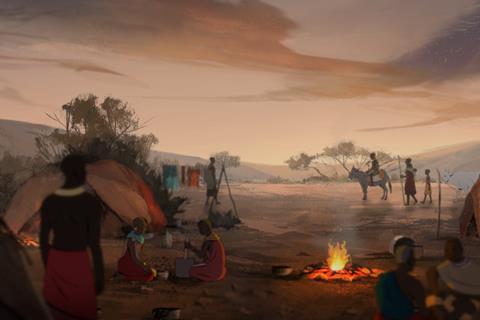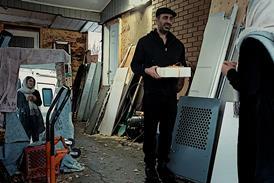
Spain’s animation sector is out in force at this week’s Annecy International Animation Film Festival.
María Trénor’s Rock Bottom playing in the feature Competition, and Black Butterflies, directed by David Baute, and Sultana’s Dream, from Isabel Herguera, both screening in the Contrechamp Competition. Contrechamp was last year won by Pablo Beger’s Spain-France co-production Robot Dreams, which went on to be nominated for an Oscar.
Further Spanish feature productions playing at the festival include Buffalo Kids co-directed by Jesús García Galocha and Pedro Solís (Annecy Presents) and Irene Iborra Rizzo’s Olivia And The Invisible Earthquake (presented as a work-in-progress), and shorts When It Comes (Official Competition) and The Change Of The Wheel (Perspectives).
Additionally, the MIFA Pitches sessions includes several projects backed by Spanish companies, including Salvador Simó’ feature project Caramel’s Words and Camila Kater’s series Carne.
The strong showing is the latest evidence of a boom in animation in Spain that is attracting international collaborators to work with the country’s rich talent pool of directors, writers and animation houses. Recently, UK-based Film Constellation took international rights to Fernando Trueba and Javier Mariscal’s They Shot The Piano Player, French sales agents Charades and Elle Driver boarded Berger’s Robot Dreams, while Canada and Spain-based Pink Parrot is launching Steve Majaury and Andrea Sebastia’s Superklaus this Christmas.
Playing in Annecy’s Contrechamp is Pakistan production The Glassworker, directed by Usman Riaz and produced by Spain’s Manuel Cristóbal, whose credits include the Gkids-distributed Buñuel In The Labyrinth Of The Turtles, while other examples include Dragonkeeper, a Chinese co-production directed by Jianping Li and Salvador Simó which premiered at the Malaga Film Festival in March; and The Violinist, a Spain-Singapore co-production directed by Raúl García and Erwin Han which is being readied by by TV ON’s Paloma Mora.
Meanwhile renowned Spanish animation filmmakers such as Alberto Mielgo (2022 Oscar-winning short film The Windshield Wiper), Sergio Pablos (Klaus, co-creator of Illumination-Universal’s Despicable Me) and Emmy-winning Rodrigo Blaas (Trollhunters: Tales of Arcadia) continue to work on huge projects abroad.;
Notably, live-action producers and directors, such as Trueba and Berger, and companies such as Alba Sotorra (Rock Bottom) and Mr Miyagi (Hannah And The Monsters) are moving into animation. “This adds prestige to the sector,” says Sultana’s Dreams producer Chelo Loueiro. “Animation is cinema. It’s just a different technique.”
“Animation is increasingly cross-genre and cross-target,” adds Black Butterflies producer Edmon Roch.
And as Jordi Gasull, producer of Buffalo Kids, points out, “its profitability is more enduring than live action.”
Facing challenges
This growth is bringing some challenges to the sector. The capacity to absorb the increased number of projects, for example, and the need to change existing financing schemes to accommodate a larger number of big-budget films. Producers also agree on the difficulties of finding available talent, such as senior editors. During the pandemic, many Spanish animators began to work remotely with large international studios, a trend that persists and can limit their ability to work on local animations.
Animations made in Spain can benefit from a tax credit of 25% - 30% on eligible costs. It is higher in some regions such as the Canary Islands which offers a tax break of 54%-45% with no added VAT. At the end of April the islands abolished the €50m cap on total annual tax incentives. Additionally, Bilbao, and its territory Biscay, now offers one of the highest tax incentives in Europe: a 60% credit if local expenses exceed 50% of the production’ total budget.
There is a call for further support for animated projects, particularly for the devleopment stage and for family-targeted films. “In animation, it is very noticeable if you invest one more Euro,” says producer Loureiro, “but if you remove it it’s even more so.”
Nathalie Martinez, president of the Spanish animation association Diboos agrees. “Think about a teaser trailer,” she says. “The budget and time required for an animated version is 10 times more to a live-action one.”
Gasull, who also produced Mummies, which was distributed internationally by Warner Bros and grossed $50m worldwide in 2023, points to the economic impact of producing Mummies in Spain.
“[State financial incentives] contributed €1.5m to Mummies,” he revealed. “We have returned €4.5m in terms of VAT, personal income tax, and box office taxes. It has been a great deal for the state. Subsidies in Spain are very well designed, but it would be good for all if they were larger, as in France.”
























No comments yet